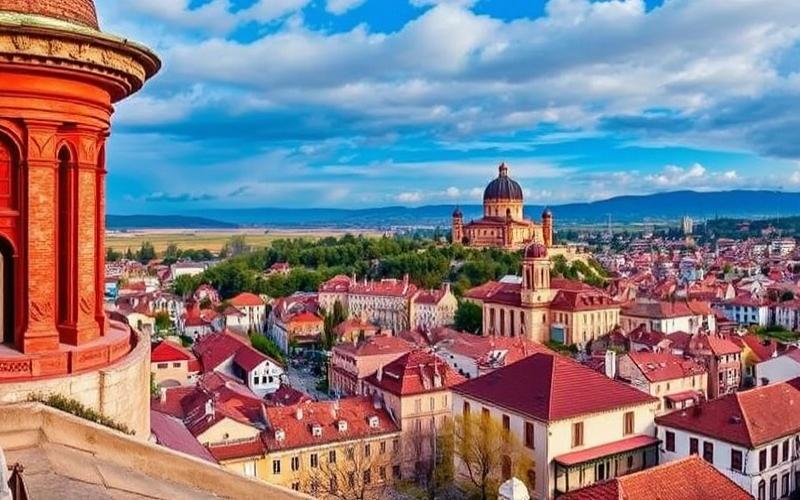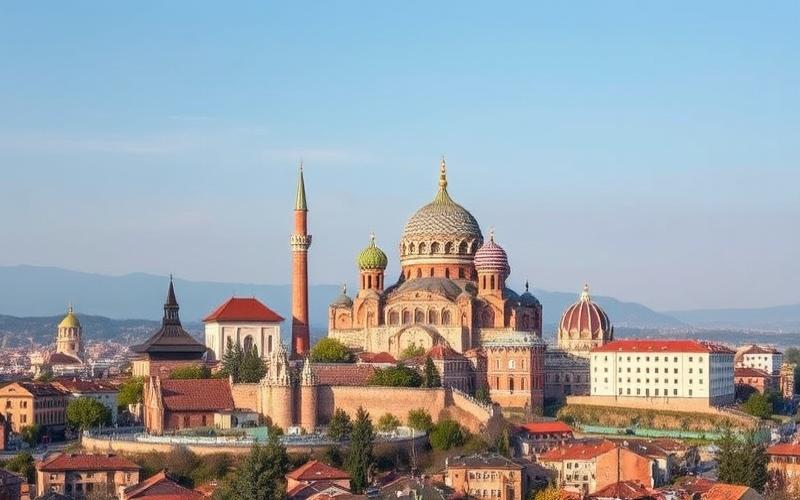
 Published on and written by Cyril Jarnias
Published on and written by Cyril Jarnias
In an era of increasing globalization, Bulgarians abroad play a significant role in their home country’s economic dynamics, transforming the local market through financial contributions and enriching cultural influences. Whether they are expatriates for economic, educational, or personal reasons, their presence abroad results in substantial investments, significant remittance amounts, and the introduction of new entrepreneurial ideas and business practices. These interactions nourish the Bulgarian economic fabric, offering opportunities while presenting unique challenges to policymakers. Understanding this complex impact is essential to fully appreciate how they shape Bulgaria’s present and future economy.
Impact of the Bulgarian Diaspora on the Local Economy
The Financial Impact of the Bulgarian Diaspora
Remittances from Bulgarians living abroad play a crucial role in the national economy. In 2022, these transfers reached $7 billion, representing approximately 1.2% of the country’s GDP. This financial windfall significantly contributes to supporting Bulgarian households, particularly in rural areas where it often represents an essential source of income. These funds are primarily used for daily expenses, healthcare, and education, thereby stimulating local consumption and enhancing human capital.
Entrepreneurial Initiatives and Innovation
The Bulgarian diaspora also plays a driving role in developing the country’s entrepreneurial ecosystem. Many Bulgarians who gained experience abroad return to launch innovative startups or invest in local businesses. For example, the RE:TURN program, launched by the Bulgarian Association for Private Equity and Venture Capital, aims to engage the diaspora in the country’s economic development. This initiative has connected Bulgarian entrepreneurs based abroad with the local innovation ecosystem, fostering knowledge and capital transfer.
Boosting Tourism and Cultural Exchanges
The Bulgarian diaspora actively contributes to promoting tourism and cultural exchanges. Many Bulgarians living abroad organize cultural events in their host countries, showcasing the richness of Bulgarian heritage. These initiatives draw attention to Bulgaria as a tourist destination and foster cultural exchanges. In 2022, an estimated 15% of tourists visiting Bulgaria were somehow connected to the diaspora, either as diaspora members themselves or as friends or acquaintances influenced by Bulgarians living abroad.
Influence on Economic Policies
The Bulgarian diaspora exerts growing influence on the country’s economic policies. Organizations such as the East-West Indological Foundation, established in 1997, play an important role in strengthening cultural and economic ties between Bulgaria and other countries. These networks facilitate trade and transnational investments, thereby contributing to Bulgaria’s integration into the global economy.
Challenges and Opportunities
Despite these positive contributions, Bulgaria faces challenges related to emigration, including brain drain and population aging. However, the high return rate of Bulgarian migrants, particularly those who emigrated to other EU countries, offers opportunities for transferring skills and experiences acquired abroad. Government initiatives aimed at facilitating the reintegration of returning migrants into the Bulgarian labor market could maximize these potential benefits.
Future Prospects
The ongoing engagement of the Bulgarian diaspora in the country’s economic development offers promising prospects. Foreign direct investments from the diaspora reached €3.15 billion in 2022, placing Bulgaria fifth among foreign investors. This trend, combined with increasing remittances and the return of skilled migrants, could play a crucial role in Bulgaria’s economic transformation, fostering innovation, job creation, and sustainable growth.
Good to Know:
The Bulgarian diaspora plays a crucial role in the local economy through its remittances, which represented about 3% of Bulgarian GDP in 2022, thereby stimulating consumption and local investment. Initiatives such as tech companies opened by returning expatriates contribute to innovation, creating hundreds of jobs in the technology sector. Furthermore, tourism promotion is strengthened by Bulgarians abroad, who act as cultural ambassadors, attracting thousands of visitors annually. Examples like the city of Plovdiv in 2019, where cultural exchanges boomed thanks to events promoted by the diaspora, illustrate this significant impact. Finally, collaborations between Bulgaria and countries hosting many expatriates, often encouraged by Bulgarian lobbies, positively influence economic policies, increasing foreign direct investment.
Real Estate in Bulgaria: A Market Coveted by Foreigners
The Bulgarian Real Estate Market: A Gold Rush for Foreign Investors
The real estate market in Bulgaria is experiencing rapid growth, particularly in major cities like Sofia and Varna. In Sofia, prices surged by over 70% between 2015 and 2021, reaching peaks of €4,500 per square meter for new downtown properties in 2024. Varna, the second most attractive hub, sees average prices hovering around €2,000 per square meter, with peaks up to €3,000 for the most sought-after properties.
This price surge has not dampened foreign investors’ enthusiasm; quite the contrary. Bulgaria remains a prime destination for several reasons:
- Acquisition costs significantly lower than in other European countries
- A pleasant Mediterranean climate, especially on the Black Sea coast
- Favorable taxation, with a flat 10% income tax rate
- Attractive rental yields, reaching up to 6% in some areas
A Melting Pot of International Investors
British, Russian, and German nationals are among the most represented in the Bulgarian real estate market. Chinese and Middle Eastern investors are also increasingly present, attracted by investment opportunities and the possibility of obtaining residency permits.
The most sought-after properties vary by profile:
- Urban apartments in Sofia for investors seeking rental yields
- Vacation homes on the Black Sea coast for individuals seeking holiday retreats
- Rural properties in the countryside for authenticity enthusiasts
Impact of Foreign Investments on the Local Economy
The influx of foreign capital has a mixed effect on Bulgarian communities. On one hand, it stimulates the local economy, creates jobs in the construction and service sectors, and contributes to infrastructure modernization. On the other hand, rising real estate prices make homeownership more difficult for local residents, especially in the most sought-after areas.
In Sofia, for example, the average apartment price now represents over 10 years of the average Bulgarian salary, compared to about 5 years a decade ago.
An Evolving Regulatory Framework
Bulgarian legislation regarding property purchases by foreigners has significantly relaxed since the country joined the European Union in 2007. EU nationals can now acquire real estate without restrictions, while non-Europeans must use a Bulgarian legal entity to purchase land.
The Bulgarian government has also implemented incentives to attract foreign investors, such as the possibility of obtaining permanent residency by investing at least €500,000 in the country’s economy.
Inspiring Success Stories
Many foreigners have successfully bet on Bulgarian real estate. Take John, a British retiree who bought a vacation home in Sozopol in 2015 for €100,000. Today, his property is valued at over €200,000, and he earns comfortable rental income during the summer season.
Maria, a German entrepreneur, invested in several apartments in Sofia in 2018. She rents them to expatriates and foreign students, generating a 7% annual return on her initial investment.
The Key Role of the Bulgarian Diaspora
Bulgarians abroad play an important role in the dynamism of the national real estate market. Leveraging their knowledge of the country and international networks, they often serve as intermediaries between foreign investors and the local market.
Some diaspora members invest in their home country themselves, either to prepare for their return or as financial investments. This trend helps maintain strong economic ties between Bulgaria and its expatriate community while stimulating the national real estate market.
Good to Know:
The real estate market in Bulgaria, particularly attractive in Sofia and Varna, is undergoing significant transformation with notable price variations. It appeals to many foreigners due to purchase costs often lower than in Western Europe, a pleasant climate, and advantageous tax incentives. The most frequent investors come from Russia, the United Kingdom, and Scandinavian countries, primarily targeting urban apartments and vacation homes. These investments stimulate the local economy but also cause price increases for residents. Although property purchases by foreigners are regulated, recent simplifications and reforms facilitate this process. Former Bulgarian expatriates, often key market players thanks to their networks, testify to notable successes, illustrating the opportunities offered by this dynamic market.
The Role of Remittances in the Bulgarian Economy
The Importance of Remittances for the Bulgarian Economy
Remittances sent by Bulgarians working abroad play a crucial role in the country’s economy. In 2023, these transfers reached a new record of €1.32 billion, a 25% increase compared to the previous year. This amount represents a significant contribution to Bulgaria’s GDP, even exceeding the volume recorded before the COVID-19 pandemic. These funds have become essential for a significant portion of the population remaining in the country, particularly to cope with widespread global inflation.
Main Transfer Channels
Bulgarians abroad use various methods to send money to their loved ones. International bank transfers remain a popular option, with arrival times typically between 3 and 5 business days. Fast money transfer services, like Western Union, are also widely used despite higher costs, as they allow nearly instant transfers. Bulgarian bankers estimate that 25% of transferred amounts are in cash, thus escaping official statistics.
Impact on the Banking Sector and Daily Economy
These transfers have a significant effect on the Bulgarian banking sector, stimulating savings and promoting credit issuance. At the household level, they cover essential expenses such as bills, medication, healthcare, and food. According to experts, at least 2 million households depend on this financial windfall for their daily subsistence. These funds also contribute to real estate investment and small business financing, playing an important role in local economic development.
Geographical Disparities in Benefits
Although precise data on the geographical distribution of transfers is unavailable, rural areas and small towns likely benefit more from these funds. Indeed, these regions have often experienced greater emigration and therefore depend more heavily on foreign remittances. Major cities like Sofia, although他们也 receive transfers, generally have a more diversified economy and are less dependent on these financial flows.
Effects on Inequalities and Regional Development
Remittances have a complex impact on economic inequalities in Bulgaria. On one hand, they allow many families to maintain a decent standard of living and contribute to the economic development of less favored regions. On the other hand, they can widen gaps between households receiving these transfers and those who do not. However, these funds play a crucial role in maintaining the social and economic fabric of many rural communities, thereby slowing the exodus to large cities.
Public Policies and Transfer Facilitation
The Bulgarian government has recognized the importance of these transfers for the national economy. Efforts have been made to facilitate and secure money transfers, particularly by collaborating with financial institutions to reduce transaction costs. The Bulgarian National Bank (BNB) has implemented measures to improve the transparency and efficiency of international transfers. However, challenges remain, particularly regarding financial inclusion of rural populations and combating informal transfers.
Testimonials and Impact on Local Living Standards
Maria, 45, from Plovdiv, testifies: “The money my son sends us from Germany allows us to pay our bills and buy medicine. Without it, our life would be much harder.” Ivan, 62, from a village near Varna, adds: “Thanks to the transfers from my daughter who works in Spain, I was able to renovate our family home and start a small handmade products business.” These testimonials illustrate the crucial importance of these transfers for many Bulgarian families.
Future Challenges and Opportunities
The Bulgarian economy faces significant challenges in the context of global migration and economic developments. Dependence on foreign remittances can make the country vulnerable to external economic shocks. It is crucial for Bulgaria to find a balance between benefiting from these transfers and developing a robust, diversified local economy. Opportunities lie in strategically using these funds to stimulate innovation, entrepreneurship, and education, creating attractive future prospects for young Bulgarians in their home country.
Good to Know:
Remittances from Bulgarians abroad play a crucial role in the Bulgarian economy, representing about 3% of GDP. These funds are primarily channeled through bank transfers and services like Western Union. They stimulate consumption, support the banking sector, and promote investment in real estate and small businesses, especially in rural regions. Areas like Vidin and Montana particularly benefit, partially mitigating regional economic disparities. However, these capital flows sometimes exacerbate inequalities, not always benefiting regions less connected to migration dynamics. The Bulgarian government has implemented tax incentives to facilitate these transfers, but their impact remains mixed. Testimonials from families dependent on these funds reveal improved living standards, although the future remains uncertain given migration changes and global economic developments.
Disclaimer: The information provided on this website is for informational purposes only and does not constitute financial, legal, or professional advice. We encourage you to consult qualified experts before making any investment, real estate, or expatriation decisions. Although we strive to maintain up-to-date and accurate information, we do not guarantee the completeness, accuracy, or timeliness of the proposed content. As investment and expatriation involve risks, we disclaim any liability for potential losses or damages arising from the use of this site. Your use of this site confirms your acceptance of these terms and your understanding of the associated risks.

































































